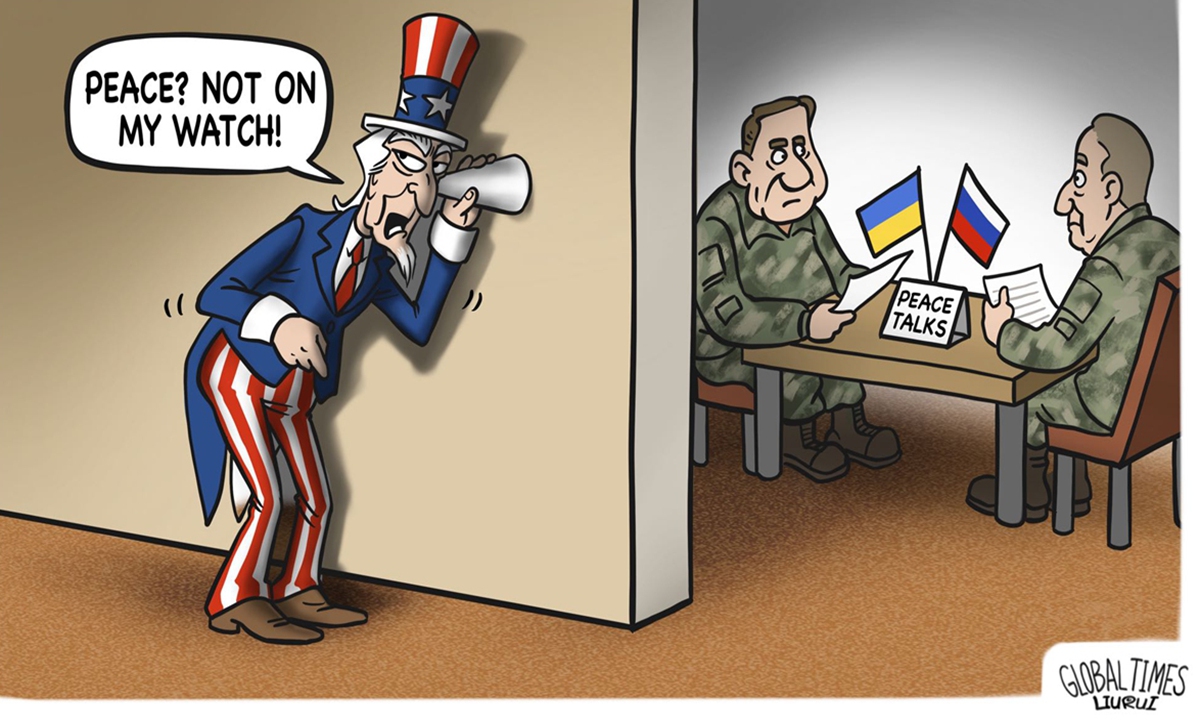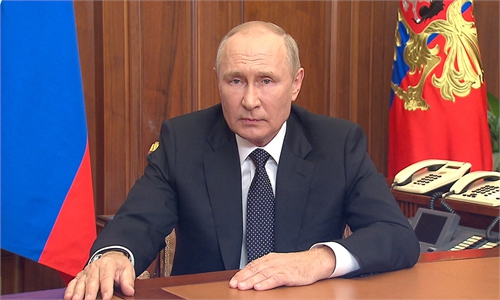Solving Russia-Ukraine conflict requires more countries to side with peace

Illustration: Liu Rui/GT
In a televised national address on Wednesday morning local time, Russian President Vladimir Putin ordered the partial mobilization of the Russian population. Russia's defense minister later announced the call-up of 300,000 reservists.
The possibility of the Russia-Ukraine conflict evolving from a localized "special military operation" into a full-scale "war" has increased significantly.
Today, in the 21st century, the Russia-Ukraine conflict has triggered a military, political, diplomatic, financial and economic war between the US, the West and Russia, which has spread around the world and has had a serious impact on the development of many emerging economies.
The Russia-Ukraine dispute is a product of European geopolitical changes. It's also a historical product of "spheres of influence" and "group confrontation."
European Commission President Ursula von der Leyen said in the 2022 State of the Union address at the European Parliament in Strasbourg on September 14, "Let's be very clear: there is a lot at stake here. Not just Ukraine - but the whole of Europe and the whole world." And the end? It will be "Putin will fail and Europe will prevail."
This rhetoric, which is quite representative of the West, implies the sense of superiority of Europe, that Europe's war is the world's war, that the European way of solving the war is the world's way, and that only if Europe wins, the world wins. This manifests a kind of Western hegemony - those who bow to me will prosper and those who resist will perish.
This is also why the West does not understand the Shanghai Cooperation Organization (SCO). In recent Western media reports and analyses of the SCO summit which was held in Samarkand, Uzbekistan on September 15-16, what we can see is that the West is more interested in the fact that SCO member states have a lot of differences due to their diverse backgrounds.
According to the logic of Western group composition, countries with different values, different political systems, different ethnic compositions and different beliefs cannot sit together, and to their extreme view, a "clash of civilizations" is bound to occur, and one side is bound to defeat the other or annex the other.
The SCO, however, has built such a platform precisely because its members are different. We can sit together, find common ground and shared interests, enhance cooperation, expand mutual trust, and solve common problems, or create conditions for solving such problems.
The fundamental difference between SCO and a bloc organization like NATO is that the former does not pursue a sphere of influence, nor does it take any third party as an adversary. Still less does it engage in forming any ideological alliance or military alliance.
The Russia-Ukraine conflict will of course have a significant impact on global peace, but to extend it to a global problem and have the whole world participate in solving it, draw lines and take sides, is not solving the problem, but making it more difficult to stop the war. To put it more seriously, it is fuelling the fire for war.
Forcibly roping in non-European powers such as China, India, Brazil and South Africa, no matter which side they stand with, will only aggravate divisions and increase the possibility that this war in Europe will become a global war.
Peace can be secured if more and more countries choose to side with peace and oppose war, not being tied to certain military groups, and not being involved in a broader war, including financial and economic sanctions.
The author is a senior editor with People's Daily, and currently a senior fellow with the Chongyang Institute for Financial Studies at Renmin University of China. dinggang@globaltimes.com.cn. Follow him on Twitter @dinggangchina


